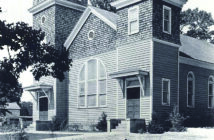In 1901, after exhibiting signs of memory loss, delusions, and temporary fugue states, Auguste Deter was admitted to a mental institution. While there, she was examined by German psychiatrist Aloysius Alzheimer, and after her death in 1906, Alzheimer eventually diagnosed Deter as having pre-senile dementia. Four years later, it became known as Alzheimer’s disease.
 Alzheimer’s disease is the sixth leading cause of death in the United States, and it is responsible for 60 to 80 percent of cases of dementia. More than 5.4 million struggle with the disease, and symptoms include memory loss, mood swings, behavioral issues, disorientation, loss of bodily functions, and eventually death. According to the Alzheimer’s Association, 140,000 Virginia residents, age 65 and older, have the disease.
Alzheimer’s disease is the sixth leading cause of death in the United States, and it is responsible for 60 to 80 percent of cases of dementia. More than 5.4 million struggle with the disease, and symptoms include memory loss, mood swings, behavioral issues, disorientation, loss of bodily functions, and eventually death. According to the Alzheimer’s Association, 140,000 Virginia residents, age 65 and older, have the disease.
There are an estimated 154 assisted living facilities in the state. One of those facilities is Sunflower Gardens, an Alzheimer’s specialty center in Hopewell that opened last August. Sunflower Gardens consists of three color-coded yet identical neighborhoods that residents live in, which Leigh Burke, vice president of -perations, describes the facility as one-of-a-kind.
” This facility is a very unique concept: it’s a town concept, so there’s three neighborhoods that the residents live in and it’s all connected to a common town. There’s a theatre, a café, a tavern, the beauty shop, drugstore, market and the residents do their day to day routine just like they would at home,” Burke said. “[They] go to the drugstore to get their medication from the [pharmacist]
, they can go to the café at any time and get a smoothie or go to the theatre and watch a movie or do arts and crafts. There’s also a chapel here [for]anyone that wants to go in and worship so it’s a very unique concept that helps people live their lives like they would if they weren’t in an assisted living facility.”
Burke said the residents partake in different activities such as arts and crafts for fine motor skills, walking outside and through town, and having lunch at the Moose Lodge; they will eventually have musical groups to entertain the residents in the evening.
Like Sunflower Gardens, Magnolias of Chesterfield is specifically for people who have Alzheimer’s and dementia. Magnolias is a memory care assisted living facility that has spacious private and semi-private rooms with walk-in showers, cable television, and climate control panels.
In addition to exercise, Magnolias also offers therapy dogs and art and music therapy for its residents. Chad Hinnant, former executive director of the facility, said this has all led to positive experiences.
“The immediate improvements in people’s lives through music and art therapy are self-confidence. We work with people who have physical but also emotional pain,” Hinnant said. “Sitting down in front of a blank canvas can be intimidating, [but]mixing color and completing a drawing stimulates conversation, [and it]requires people to be social. [The] social connections with Alzheimer’s are too often the part of a person that gets lost, [and the]kindness of sharing time together can be all that someone might need that day to feel a purpose.”
Gina Wiles, director of marketing and admissions at Dunlop House, echoes Hinnant’s sentiments about the benefits of art and music therapy.
“Using art, music, and pet therapy provides different ways of social care. Everyone comes with different backgrounds and interests, [so it]is important to try … different ways to engage our residents,” Wiles said. “When in the right environment and given the appropriate help, we have seen stabilization and sometimes improvement in our memory care residents.”
Dunlop House is an assisted living and memory care facility in Colonial Heights, and their dementia and Alzheimer’s residents are provided care through the Reflections Memory Care Program. The facility offers activities such as painting, gardening, and exercising, and Wiles said there are three separate and small neighborhoods that addresses each stage of dementia and Alzheimer’s disease.
For entertainment, Dunlop House has live music and singers, religious services, help from volunteers in the community, and computer-enhanced learning with their “It’s Never Too Late” software.
The Crossings at Ironbridge is similar to Dunlop House as it also provides assisted living for seniors in addition to being a memory care community. Harmony Square, the facility’s memory care neighborhood, has 20 suites, supervised access to all amenities, and assistance from the staff.
Carolyn Morton, The Crossings’ director of sales and marketing, said the facility has been in Chester for 20 years and talked about their Reflections Program.
“The Reflections Program utilizes a variety of individualized care plan therapies to each resident where he/she is. We help him/her to see how much he/she can still do every day,” Morton said. “Art, music and reading are integral channels in this endeavor, as they also have tremendous health benefits. Residents may partake in painting, stamping, or pasting as an art project, [and]musicians come for dancing and singalongs. Activity time brings residents of all capabilities together for important socialization.”

